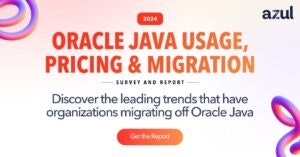
In the spring of 2024, Azul launched the first annual Oracle Java Usage, Pricing & Migration Survey and Report, soliciting feedback from current and former users of Oracle Java to assess the impact of Oracle’s Java pricing changes and their plans for migrating to alternative JDKs. In this blog post we examine some migration trends from the survey.
In January 2023, Oracle changed its Java licensing and/or pricing model for the fourth time in four years. Under the new pricing announced, Oracle Java customers pay based on the number of employees – including part-time workers and contractors. How did Oracle Java customers, and the broader Java community, respond to these changes?
In the spring of 2024, Azul launched the Oracle Java Usage, Pricing & Migration Survey and Report, soliciting feedback from current and former users of Oracle Java to assess the impact of the announced pricing changes and their plans, reasons behind, and overall experiences migrating to alternative JDKs.
Overall, 45% of survey participants have already migrated off Oracle Java or are currently migrating all their Java off Oracle. When we dug into the results, we found that progress was not consistent across regions. A higher percentage of European and Asian participants have already migrated off Oracle, while a higher percentage of North American participants said they are currently migrating or pan to migrate all their Java off Oracle.
| Region | Already Migrated | Currently Migrating All Java | Currently Migrating Some Java | Plan to Migrate All Java | Plan to Migrate Some Java | Play to Stay with Oracle |
|---|---|---|---|---|---|---|
| All | 25% | 20% | 18% | 15% | 9% | 14% |
| North America | 20% | 23% | 18% | 17% | 9% | 13% |
| Europe | 34% | 13% | 18% | 12% | 11% | 12% |
| Asia | 30% | 20% | 13% | 11% | 3% | 23% |
| Australia | 19% | 17% | 22% | 11% | 14% | 17% |
| South America | 18% | 27% | 27% | 9% | 0% | 0% |
| Middle East | 50% | 30% | 20% | 0% | 0% | 0% |
The next area we dived into was company size. Smaller companies, with under 1,000 employees, have already migrated from Oracle Java in larger percentages than the total survey population. Interestingly, the largest companies in our survey, with more than 10,000 employees, also report having completed their migrations off Oracle Java in larger percentages than the total survey population.
| Company Size | Already Migrated | Currently Migrating All Java | Currently Migrating Some Java | Plan to Migrate All Java | Plan to Migrate Some Java | Play to Stay with Oracle |
|---|---|---|---|---|---|---|
| All | 25% | 20% | 18% | 15% | 9% | 14% |
| 100- 1,000 |
34% | 17% | 20% | 12% | 5% | 12% |
| 1,001-5,000 | 21% | 24% | 16% | 14% | 10% | 15% |
| 5,001-10,000 | 22% | 21% | 16% | 22% | 7% | 12% |
| 10,000+ | 30% | 15% | 22% | 9% | 11% | 13% |
The critical factor is cost. When asked why they decided to migrate off Oracle Java, participants’ top three reasons were:
- Cost (53%)
- Preference for open source (47%)
- Uncertainty over Oracle’s ongoing pricing, licensing, and support changes (38%)
The Oracle Java migration is happening now and is expected to continue in the future. Roughly two-thirds of survey participants who plan to migrate off Oracle Java (but haven’t started yet) plan to start their migration within two years. And more than half of participants who are migrating off Oracle Java (or are planning to) expect to complete their migrations from Oracle Java to OpenJDK within two years.

Conclusion
Azul launched the Oracle Java Usage, Pricing & Migration Survey and Report to assess the trends and
reasons behind Oracle Java users migrating to OpenJDK distributions. In this new survey, only a small minority of Oracle customers (14%) indicate they are willing to stick with Oracle Java given the importance of cost by over half of the survey respondents. Most of those that have already made the switch to an OpenJDK distribution did so in less than a year and found that it was easier than expected or within their expectations.





